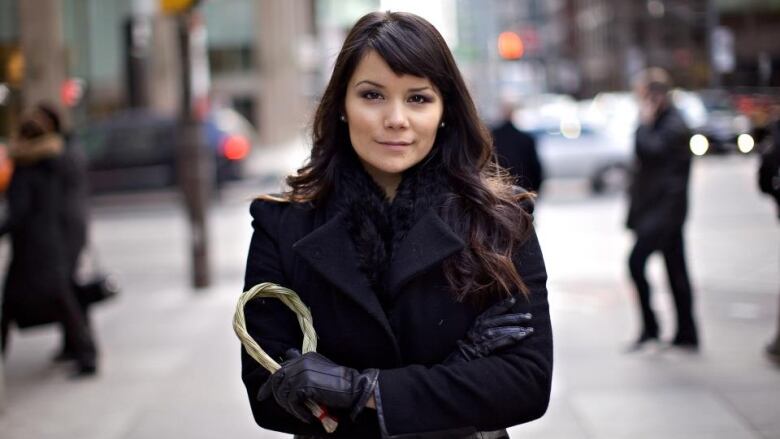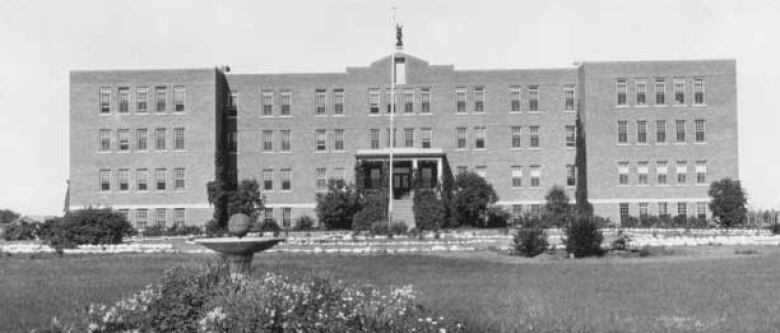Reconciliation makes good business sense, says Scrimshaw
Reconciliation: A new generation of aboriginal Canadians weighs in - Part 2

Gabrielle Scrimshaw is Co-Founder and President at the Aboriginal Professional Association of Canada. Previously, she was an Associate in the Graduate Leadership Program (GLP) at the Royal Bank of Canada.Gabrielle was born and raised in Northern Saskatchewan and is a proud member of the Hatchet Lake First Nation.
How have you been affected by the legacy of residential schools?
My grandparents on my mothers side decided to take my mother on the trap line when she was young so she wouldnt have to go to residential school because they had seen a lot of the abuses that were occurring.
But sadly, that didnt mean that my mother was able to escape a lot of the legacy and issues that residential schools left within our family and our communities. She had a lot of demons because of that.
- Visit CBC Aboriginalfor more Truth and Reconciliation coverage
- Reconciliation: A new generation of aboriginal Canadians weighs in - Reneltta Arluk
- Missing indigenous women key to reconciliation, says Champagne
- How hockey offered salvation at Indian residential schools
What that meant for me personally, [is that] I grew up without a mom in my life.
I dont blame my mother for anything. I really dont, I think she is a beautiful, strong person. I just think that what she had to go through, I cant imagine.
What do you think is the impact of Truth and Reconciliation commission?

I wasnt really aware for the majority of my life why I didnt grow up with my mother.
This week, the Truth and Reconciliation Commission of Canada hosts its final national event in Edmonton. We've asked voices from the first generation of aboriginal people who didn't attend a residential school to share their thoughts on reconciliation and what the legacy means to them.
Even though I grew up in a town where there was a big brick worn out residential school just down the road and around our communities wesaw the issues, legacies left from the school but we didnt talk about it.
Were only starting to really talk about this and understand and connect the dots and for me this happened really recently.
For me, [understanding] is helping me heal from some of the pain that I had from not growing up with mymother.And [to have] forgiveness and understanding that it wasnt her fault. It wasnt my fault. It was this terrible legacy left in our community that were still dealing with.
Do you think reconciliation is possible?
I really believe that reconciliation can be possible but its going to take a long time and there is no one right approach.
One day,Ill have kids of my own and my dream for them is to speak their language, to say theyre First Nation and... to be proud and to find strength in that.- Gabrielle Scrimshaw
As Canadians, we tout our values internationally, we hold our flag up close to our hearts but I think if we really want to live by the values we hold so dear and actually be an inclusive country then [we need] reconciliation.
One day, Ill have kids of my own and my dream for them is to speak their language, to say theyre First Nation and not to be afraid of any reaction to that and to be proud and to find strength in that. That is my dream for them and that is, I think, right in-line with the values that Canadians say they hold dear.
So, do I think its possible? I really hope and think it is.
What are some of the challenges?

What can non-indigenous Canadians do to help?
'There are significant social savings but also revenue generators that our country is leaving on the table simply by not addressing these issues.- Gabrielle Scrimshaw
Talk about it. Talk about indigenous issues in this country right now.Its not only a human rights violation and scar in our country but there is also an economic case to be made for why this is important.
There are significant social savings but also revenue generators that our country is leaving on the table simply by not addressing these issues.And this isnt thousands of dollars, its actually not millions of dollars, its billions of dollars.
Its a significant amount of money that were leaving on the table simply because were uncomfortable as a country to talk about it and turn the corner and deal with this issue in order to walk in to a future that we can be proud of.












_(720p).jpg)


 OFFICIAL HD MUSIC VIDEO.jpg)
.jpg)



























































































